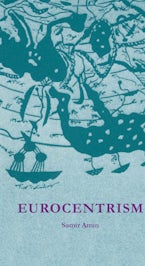Since its first publication twenty years ago, Eurocentrism has become a classic of radical thought. Written by one of the world’s foremost political economists, this original and provocative essay takes on one of the great "ideological deformations" of our time: Eurocentrism. Rejecting the dominant Eurocentric view of world history, which narrowly and incorrectly posits a progression from the Greek and Roman classical world to Christian feudalism and the European capitalist system, Amin presents a sweeping reinterpretation that emphasizes the crucial historical role played by the Arab Islamic world. Throughout the work, Amin addressesa broad set of concerns, ranging from the ideological nature of scholastic metaphysics to the meanings and shortcomingsof contemporary Islamic fundamentalism. This second edition contains a new introduction and concluding chapter, both of which make the author’s arguments even more compelling.

